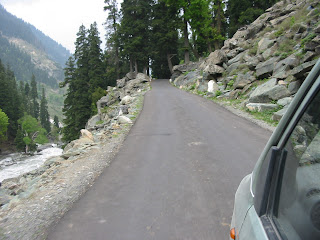Ever heard of 'Kipple'? It's similar to 'Entropy'
"Kipple is useless objects, like junk mail or match folders after you use the last match or gum wrappers or yesterday's homeopape. When nobody's around, kipple reproduces itself."
Kipple seems to be a combination of entropy and capitalism. I don't think past civilizations had the resources to produce so much packaging to hold our stuff until we buy it or consume it.
Don't forget the First Law: "There's the First Law of Kipple…'Kipple drives out nonkipple'."
| Kipple is useless objects, like junk mail or match folders after you use the last match or gum wrappers or yesterday's homeopape. When nobody's around, kipple reproduces itself. For instance, if you to go bed leaving any kipple around your apartment, when you wake up there is twice as much of it. It always gets more and more.No one can win against kipple, except temporarily and maybe in one spot. |
| From Do Androids Dream of Electric Sheep?, by Philip K. Dick. Published by Doubleday in 1968 |
According to the philosopher of kipple in the novel, J.R. Isadore, "the entire universe is moving toward a state of total, absolute kippleization." Physicists will note the similarity to the concept of entropy, which is most usually taken to refer to the tendency of closed systems toward increasing disorder.
I like the definition taken from classical thermodynamics, that entropy is a quantitative measure of the amount of thermal energy not available to do work. In the 21st century, we seem to be working as hard as we can to take available resources and transform them into objects that cannot be used for anything (kipple). We are doing this socially as well; by using welfare, we encourage our human resources not to do work, either. If we can recycle paper, we can recycle people, too. [Source]
Reproducing a post from a decade ago - "US National Debt - Entropy in the 21st century"
Ridiculous? Incredible? Mind-boggling? Flabbergasting? Indecent? There is probably no single word to help convey all that the obese(!) US national debt figures will eventually mean to humans alive now and to several future generations.
So the counter ran out of digits, did it?
Where did it all go? We should surely be able to see where -
- in glass fronted sky-high edifices? - And among the debris in Afghanistan and Iraq
- in over-obese consumers' frames? - And in the hollow eyes and malnourished, bloated underbellies of the world's poor children
- in vulgar luxury infrastructure? - And in dried-up, empty farm lands
- in over-stuffed homes? - And in laid-bare forests
- in gleaming and overflowing supermarkets? - And in grotesque landfills and toxic oceanfills
Entropy - even as the word occurred in the mind, I felt that this term fills in where other words fail. In the field of thermodynamics, Entropy is "a measure of the partial loss of the ability of a system to perform work due to the effects of irreversibility", to cite just one of many definitions.
It is likely that implications of the US national debt will be explained as a kind of entropy.
Apparently it is - I'm not surprised at this - See Entropy: A new World view The authors "seek to analyse the world's economic and social structures by using the second law of thermodynamics, that is, the law of entropy. The authors argue that humanity is wasting resources at an increasing rate, and that will lead to the destruction of our civilization, which has happened before on a smaller scale for past empires. The book promotes the use of sustainable energy sources and slow resource consumption as the solution to delay the inevitable: death by entropy".
So the counter ran out of digits, did it?
Where did it all go? We should surely be able to see where -
- in glass fronted sky-high edifices? - And among the debris in Afghanistan and Iraq
- in over-obese consumers' frames? - And in the hollow eyes and malnourished, bloated underbellies of the world's poor children
- in vulgar luxury infrastructure? - And in dried-up, empty farm lands
- in over-stuffed homes? - And in laid-bare forests
- in gleaming and overflowing supermarkets? - And in grotesque landfills and toxic oceanfills
Entropy - even as the word occurred in the mind, I felt that this term fills in where other words fail. In the field of thermodynamics, Entropy is "a measure of the partial loss of the ability of a system to perform work due to the effects of irreversibility", to cite just one of many definitions.
It is likely that implications of the US national debt will be explained as a kind of entropy.
Apparently it is - I'm not surprised at this - See Entropy: A new World view The authors "seek to analyse the world's economic and social structures by using the second law of thermodynamics, that is, the law of entropy. The authors argue that humanity is wasting resources at an increasing rate, and that will lead to the destruction of our civilization, which has happened before on a smaller scale for past empires. The book promotes the use of sustainable energy sources and slow resource consumption as the solution to delay the inevitable: death by entropy".
Update 08 July, 2021: Unavailable link http://www.brillig.com/debt_clock/ replaced with https://usdebtclock.org/


Comments
Post a Comment
i appreciate that you have some thoughts to share, and are taking the effort to do so.